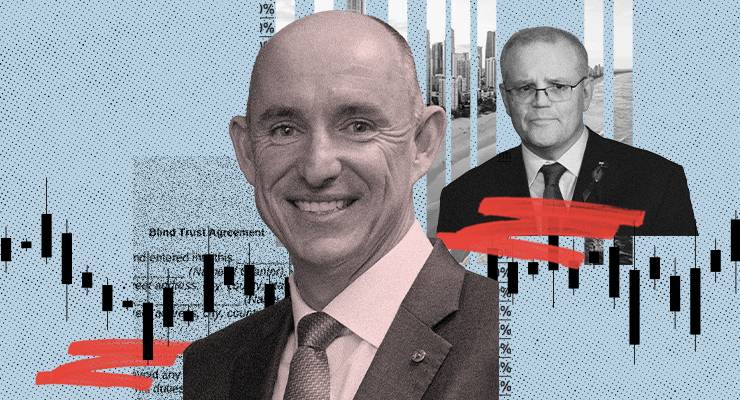
This article is part two of Blind Trust: the PM and Brother Stuey. For the full series, go here.
Stuart Robert is the luckiest person in Parliament. Three years ago his political career was in the toilet. Expelled from Malcolm Turnbull’s ministry after a conflict of interest scandal, he languished on the backbench with no salvation in sight.
Then along came Scott Morrison and everything changed. “Brother Stuie”, as Morrison affectionately knows him, was back — in the ministry, in the cabinet, and at the top table of government; seemingly untouchable as the prime minister’s right hand man and political best friend.
Morrison, in short, has put things right for Robert. In so doing, he has made a clear statement that as far as he is concerned, Robert’s breach of ministerial standards doesn’t matter. It’s a clear signal that Robert could do the same again with impunity.
Why does that matter?
Robert has fixed the conflict of interest problems that have plagued his parliamentary career. How? By simply ceasing to make a public declaration of any of his financial interests, even though he is one of Parliament’s wealthiest members and has close relationships with big-money developers and mining executives.
Robert’s parliamentary register of interests — which is crucial to integrity in government — is now little more than a blank page.
The register exists to provide information, for the public, on politicians’ personal and family sources of income. Robert has not provided any answers on extra sources of income other than to refer to distribution from a “blind trust”, which he insists is in line with the prime minister’s statement of ministerial standards. This places Morrison at the centre of ensuring that Robert is doing the right thing.
In Crikey‘s new investigation Blind Trust: the PM and Brother Stuie, we reveal that in the months before Robert was returned to the ministry in late 2018, he had struck up a close business relationship with a Gold Coast entrepreneur who has Australia-wide investments in the disability sector. The two were co-directors of a company which held some of Robert’s investments.
After the 2019 federal election, Robert was promoted by Morrison and put in charge of the disability sector as minister for the National Disability Insurance Scheme. However, with Robert’s affairs secreted in a blind trust and beyond public scrutiny, it is impossible to know if any conflicts of interest — real or perceived — exist.
The problem is that Robert has a history of questionable dealings when it comes to public office. He has used Parliament to spruik party donors, then denied any link. He has used taxpayers money for private purposes, then been forced to pay it back when caught — all the while denying he has done anything wrong.
He came to grief under Malcolm Turnbull partly because he had shares in the same company as a wealthy Liberal donor and friend — a holding that only became public knowledge after Robert fronted with his friend at a business deal in China.
As our investigation shows, Robert refuses to disclose the identity of the trustee of his blind trust, despite that disclosure being a key element of public accountability. What if the person handling Robert’s financial affairs is an old friend? Or a family member? At this stage that is between Morrison and Robert. The public has no idea.
Making matters worse, Morrison’s ministerial standards are vague on what level of detail needs to be publicly disclosed on blind trusts. Other parliaments in Australia insist, at the very least, that the name of the trustee be made public.
Former attorney-general Christian Porter’s refusal to give any details on the trust structure he used to fund his legal actions against the ABC marked a low in government accountability. In his case, the structure was not technically a blind trust, though it had a similar effect of keeping financial information secret (even, allegedly, from Porter himself).
But Robert’s use of a blind trust and refusal to give any public detail points to a wider and potentially more serious lack of transparency.
Crikey is not alleging any wrongdoing. The point is that where a minister of the Crown has a blind trust the public should have a right to transparency, so there can be no suggestion of a conflict of interest.
In this multi-part investigation, Crikey examines the relationship between Morrison and Robert, and looks at Robert’s history of undeclared conflicts of interest.
We also look at Morrison’s own secrecy and extended network of connections when it comes to the NDIS and the federal government incentives to build specialist disability accommodation, which has been a gold-rush opportunity for some.
Next: Unimpressive as a minister, magnificent as a rainmaker.








Crikey encourages robust conversations on our website. However, we’re a small team, so sometimes we have to reluctantly turn comments off due to legal risk. Thanks for your understanding and in the meantime, have a read of our moderation guidelines.